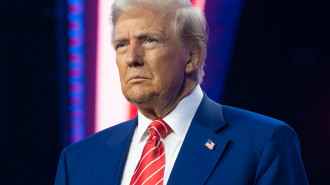Breadcrumb
JP Morgan warns of growing risk in investing in Israel due 'geopolitical tensions' and judicial reforms
Financial services firm JP Morgan has warned of the growing economic risks of investing in Israel due to Prime Minister Benjamin Netanyahu’s planned overhaul of the country’s legal system.
A leaked memo from JP Morgan said Israel was witnessing a “flareup in idiosyncratic risk” - also known as inherent risks - due to “increased geopolitical tensions” and “plans for judicial reforms,” according to Israel’s Channel 12.
The damning financial assessment came after Netanyahu had cited the bank along with Goldman Sachs to defend his legal changes, which would allow the Israeli parliament to overrule any supreme court decision.
"The judicial reform has raised concerns regarding institutional strength and the investment climate in the country," the memo read.
"One key aspect to consider compared to previous episodes [of risk] in Israel…is the potential for a more protracted period of elevated uncertainty and risk premia given the focus on domestic institutions," it said.
The proposed reforms will mean Israeli parliamentary lawmakers can overrule the Supreme Court if they have a 61 majority in the 120-seat Knesset.
In addition, it would change the system through which judges are appointed - giving politicians more control.
The JP Morgan memo also made references to the "significant local protests" in Israel against these reforms. For five consecutive weeks, thousands have taken to the streets in Tel Aviv to protest against Netanyahu’s agenda.
These protests have been mirrored in over 20 cities globally.
Israel has received foreign direct investment of up to $24.28 billion per year, according to the World Bank, with its biggest investment coming from the United States and the Netherlands.
For years, the Boycott, Divestment and Sanctions (BDS) movement has been calling on companies to divest from Israel given its systematic human rights abuses against Palestinians. While a few companies have attempted to take action, such as Ben & Jerry’s, many international companies continue to work with Israeli authorities; including Puma, SodaStream, and Sabra.
Netanyahu’s coalition, the most far-right in Israel’s history, has vocalised its intent to expand illegal settlements in the occupied West Bank and introduced a series of punitive measures to further curtail Palestinian rights and sovereignty.
During the coalition's brief time in power, Israel has stepped up raids on the Palestinian territories, with Palestinians killed almost daily in the occupied West Bank and airstrikes on the besieged enclave Gaza.






![Anthony Blinken speech [Getty] Anthony Blinken speech [Getty]](/sites/default/files/styles/image_684x385/public/media/images/6263436E-8ACD-4D3C-9055-25A7BE79DD5A.jpg?h=d1cb525d&itok=fLHmHCRG)
 Follow the Middle East's top stories in English at The New Arab on Google News
Follow the Middle East's top stories in English at The New Arab on Google News
![Many are vowing to boycott a film starring Amy Schumer, set to release next month [Getty]](/sites/default/files/styles/image_330x185/public/2152810030.jpeg?h=a5f2f23a&itok=wMRYjbOK)

